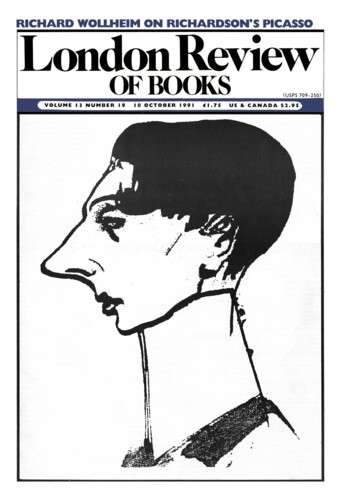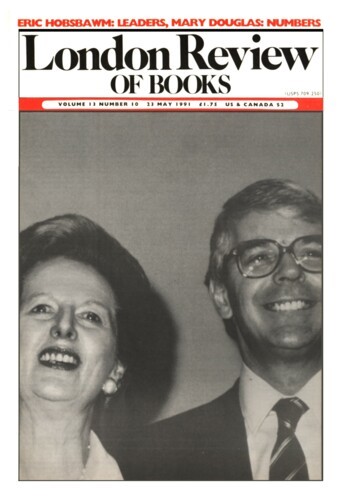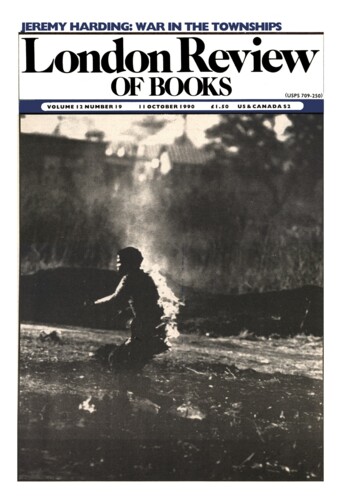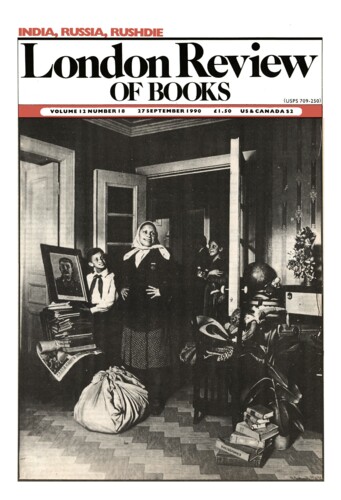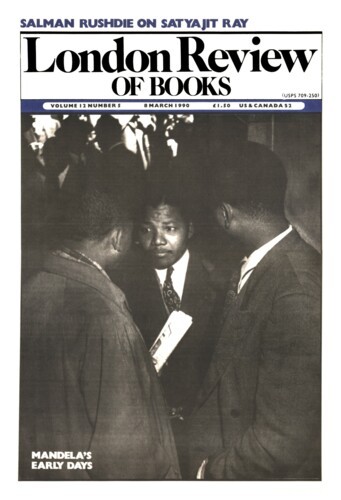Danny Karlin
Danny Karlin, an emeritus professor of English at the University of Bristol, is the author of Browning’s Hatreds and the editor of The Penguin Book of Victorian Verse.
Home-breaking
Danny Karlin, 23 May 1991
Duncan Sprott’s The Clopton Hercules is an interesting book, powerfully written, and certainly (indeed, remorselessly) clever: but one-tracked, and self-satisfied. It takes a traditional target, the bizarrerie of upper middle-class Victorian sexual behaviour, and blasts away at it with satirical vigour and relish: but the more points are scored, the more pointless the exercise begins to seem. Here we have, on the sexual front, a priapic squire, his neurotic trapped wife and swarms of lower-class mistresses, his uncontrolled lusts and lunatic outbursts of violence; and on the social front, the squire’s over-reaching ambitions for his family, his ‘meteoric rise into respectability and affluence’, followed, of course, by his spectacular fall (linked, in Dickensian or Trollopian fashion, both to sexual profligacy and to speculation on the railways). The story is based on a true case, that of Charles Warde, and incorporates documentary passages from legal proceedings and newspapers: but its historical veracity is absolutely of no importance. What matters is the rhetorical twist which Sprott gives to the events, the modern standpoint from which he sardonically represents them.
Duff Poetry
11 October 1990
Mary Swann’s Way
Danny Karlin, 27 September 1990
Jane Austen’s work seems, at first, hospitable to that literary parasite, pastiche: there isn’t much of it, so ersatz continuations or alternative narratives must satisfy the hunger for more; at the same time, the passionate familiarity which many Jane Austen readers have with her novels (demonstrated in Kipling’s wonderful story ‘The Janeites’) ensures a ready frame of reference for the imitator. But Jane Austen is, in fact, notoriously hard to ‘do’ convincingly. Joan Aiken (their names are horribly homophonic – could this have given her the idea?) is the author of Mansfield Revisited, which seems to have been successful enough to persuade her to try the market again. I have only ever read one such work, the continuation of Sanditon by ‘a Lady’ published some years ago; the bitter taste still lingers on, and I have a grudging sense that Jane Fairfax may not be quite as thin a dish of gruel as that. Instead it has an unappealing, mixed-up wrongness of flavour. It wants to be both like Jane Austen (to substitute for the real thing) and to revise Jane Austen (to be a real thing itself). Aiken disastrously fails to recognise that these are incompatible aims. She plunders Austen’s novel (sometimes quoting it verbatim or paraphrasing it closely, though ‘her’ Miss Bates or Mr Woodhouse or Emma have embalming-fluid in their literary veins); other characters derive weakly from other Austen novels (a brutal fop from Northanger Abbey, a kind-hearted mother from Sense and Sensibility) and one has strayed in wearing Mrs Jellyby’s clothes from Bleak House. At the same time, Aiken misreads Emma in crassly uninteresting ways. The plot turns on Emma’s fantasies about sexual relationships being mistaken, yet Aiken makes her daft suspicion of a liaison between Jane and Mr Dixon, formed at Weymouth, turn out to be true after all. This makes absolute nonsense of Jane’s relationship with Frank Churchill: the upright, pure-hearted, melancholy Jane is represented as choosing to enter into a clandestine engagement with a man she does not really love, and (even more ludicrously) is endowed with a romantic yearning for Mr Knightley worthy of Harriet Smith herself.’
Prolonging her absence
Danny Karlin, 8 March 1990
Henry Farr is – or, as it turns out, is not – the ‘Wimbledon Poisoner’ of Nigel Williams’s title. He is a Pooterish solicitor, middling and muddling his way through life; the plot concerns his repeated farcical failure to murder his awful wife, bumping off (he thinks) other innocent people instead. Then, as the plot unravels and a real poisoner shows his hand, Henry discovers that his wife is not so awful after all. Two kinds of decision mark the outset and outcome of this sequence of events, in the course of which Henry moves from tentative dimness to self-possession. In the book’s opening words, ‘Henry Farr did not, precisely, decide to murder his wife. It was simply that he could think of no other way of prolonging her absence from him indefinitely.’ But when the book closes, Henry faces this very prospect of indefinite togetherness with equanimity: ‘He thought about Elinor, and why he was still with her and what it would be like in the weeks and months and years to come … Killing her would have been a very stupid thing to have done. There was, he decided, as he turned over to address himself to sleep, quite a lot of mileage in her yet.’’
Pieces about Danny Karlin in the LRB
Ventriloquism: Dear Old Khayyám
Marina Warner, 9 April 2009
Edward FitzGerald transfused his own life, even as he deemed it a paltry thing, into the persona of Omar Khayyám, who would lift it from that paltriness and transfigure him. He was able to formulate through...
Provincialism: Karlin’s collection of Victorian verse
Denis Donoghue, 4 June 1998
I’ve been comparing Daniel Karlin’s anthology here and there with other anthologies of English verse of the same period (Victoria’s reign 1837-1901) and of the 19th century as a...
When in Rom
John Sutherland, 9 June 1994
Ask what has been the single greatest influence on literary research since the Sixties and the answer might be the Xerox machine, the jumbo jet or Jacques Derrida. Ask what will transform...
Browning and Modernism
Donald Davie, 10 October 1991
Browning is in high favour once again, or promises to be. Has not A.S. Byatt, CBE, declared him ‘one of the very greatest English poets’? In a switch to fighting talk, she adds that...
Read anywhere with the London Review of Books app, available now from the App Store for Apple devices, Google Play for Android devices and Amazon for your Kindle Fire.
Sign up to our newsletter
For highlights from the latest issue, our archive and the blog, as well as news, events and exclusive promotions.
